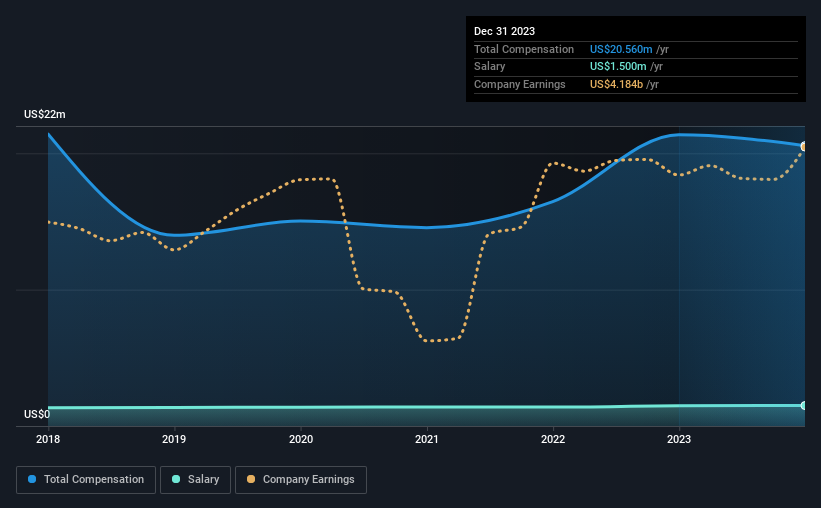- United States
- /
- Electric Utilities
- /
- NYSE:DUK
Here's Why Shareholders May Want To Be Cautious With Increasing Duke Energy Corporation's (NYSE:DUK) CEO Pay Packet
Key Insights
- Duke Energy to hold its Annual General Meeting on 9th of May
- Salary of US$1.50m is part of CEO Lynn Good's total remuneration
- The overall pay is 51% above the industry average
- Over the past three years, Duke Energy's EPS grew by 46% and over the past three years, the total shareholder return was 12%
Under the guidance of CEO Lynn Good, Duke Energy Corporation (NYSE:DUK) has performed reasonably well recently. This is something shareholders will keep in mind as they cast their votes on company resolutions such as executive remuneration in the upcoming AGM on 9th of May. However, some shareholders will still be cautious of paying the CEO excessively.
See our latest analysis for Duke Energy
How Does Total Compensation For Lynn Good Compare With Other Companies In The Industry?
At the time of writing, our data shows that Duke Energy Corporation has a market capitalization of US$77b, and reported total annual CEO compensation of US$21m for the year to December 2023. We note that's a small decrease of 3.7% on last year. While this analysis focuses on total compensation, it's worth acknowledging that the salary portion is lower, valued at US$1.5m.
On comparing similar companies in the American Electric Utilities industry with market capitalizations above US$8.0b, we found that the median total CEO compensation was US$14m. This suggests that Lynn Good is paid more than the median for the industry. Furthermore, Lynn Good directly owns US$53m worth of shares in the company, implying that they are deeply invested in the company's success.
| Component | 2023 | 2022 | Proportion (2023) |
| Salary | US$1.5m | US$1.5m | 7% |
| Other | US$19m | US$20m | 93% |
| Total Compensation | US$21m | US$21m | 100% |
On an industry level, around 11% of total compensation represents salary and 89% is other remuneration. In Duke Energy's case, non-salary compensation represents a greater slice of total remuneration, in comparison to the broader industry. If non-salary compensation dominates total pay, it's an indicator that the executive's salary is tied to company performance.

Duke Energy Corporation's Growth
Over the past three years, Duke Energy Corporation has seen its earnings per share (EPS) grow by 46% per year. The trailing twelve months of revenue was pretty much the same as the prior period.
Shareholders would be glad to know that the company has improved itself over the last few years. It's good to see a bit of revenue growth, as this suggests the business is able to grow sustainably. Historical performance can sometimes be a good indicator on what's coming up next but if you want to peer into the company's future you might be interested in this free visualization of analyst forecasts.
Has Duke Energy Corporation Been A Good Investment?
With a total shareholder return of 12% over three years, Duke Energy Corporation shareholders would, in general, be reasonably content. But they probably don't want to see the CEO paid more than is normal for companies around the same size.
To Conclude...
Seeing that the company has put up a decent performance, only a few shareholders, if any at all, might have questions about the CEO pay in the upcoming AGM. Still, not all shareholders might be in favor of a pay raise to the CEO, seeing that they are already being paid higher than the industry.
CEO pay is simply one of the many factors that need to be considered while examining business performance. In our study, we found 2 warning signs for Duke Energy you should be aware of, and 1 of them can't be ignored.
Important note: Duke Energy is an exciting stock, but we understand investors may be looking for an unencumbered balance sheet and blockbuster returns. You might find something better in this list of interesting companies with high ROE and low debt.
New: Manage All Your Stock Portfolios in One Place
We've created the ultimate portfolio companion for stock investors, and it's free.
• Connect an unlimited number of Portfolios and see your total in one currency
• Be alerted to new Warning Signs or Risks via email or mobile
• Track the Fair Value of your stocks
Have feedback on this article? Concerned about the content? Get in touch with us directly. Alternatively, email editorial-team (at) simplywallst.com.
This article by Simply Wall St is general in nature. We provide commentary based on historical data and analyst forecasts only using an unbiased methodology and our articles are not intended to be financial advice. It does not constitute a recommendation to buy or sell any stock, and does not take account of your objectives, or your financial situation. We aim to bring you long-term focused analysis driven by fundamental data. Note that our analysis may not factor in the latest price-sensitive company announcements or qualitative material. Simply Wall St has no position in any stocks mentioned.
About NYSE:DUK
Duke Energy
Through its subsidiaries, operates as an energy company in the United States.
Proven track record average dividend payer.
Similar Companies
Market Insights
Weekly Picks

THE KINGDOM OF BROWN GOODS: WHY MGPI IS BEING CRUSHED BY INVENTORY & PRIMED FOR RESURRECTION


Why Vertical Aerospace (NYSE: EVTL) is Worth Possibly Over 13x its Current Price


The Quiet Giant That Became AI’s Power Grid
Recently Updated Narratives

SLI is share to watch next 5 years


The "Molecular Pencil": Why Beam's Technology is Built to Win

PRME remains a long shot but publication in the New England Journal of Medicine helps.
Popular Narratives


MicroVision will explode future revenue by 380.37% with a vision towards success


NVDA: Expanding AI Demand Will Drive Major Data Center Investments Through 2026




